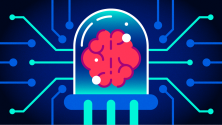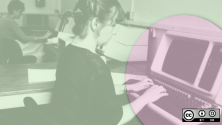I've always had a passion for technology and computers. But, with a poor upbringing in a trailer park in Flint, Michigan, I didn't have the luxury of owning a computer until I was 18. At school, I would use computers for browsing the Internet, but when I finally owned my first computer I was able to really learn how to use one.
I remember that computer well, it was a Pentium III Gateway desktop tower with a 15GB hard drive and 64MB of RAM. It ran Windows 98, which crashed on me constantly, but it was all I knew so I dealt with it. Later on, I was able to upgrade it to 384MB of RAM, which for me at the time was quite something. Later on, during the time when Napster first hit the scene, I was obsessed with downloading MP3s. Eventually, I downloaded an MP3 that contained a virus that managed to wipe out my entire computer.
I didn't have any type of restore disks for my computer, but because I was in college at the time I was able to get a discount on Windows XP Professional (just introduced at the time). After installing and activating Windows XP, I was back up and running. Around that same time, I decided to take a course on Linux as part of my elective coursework in college. I had just finished a UNIX class, so it was a no-brainer. I fell in love with Linux as soon as I started the course, which was based on Red Hat 7. This was before Red Hat Enterprise Linux (RHEL) was introduced, and back when Red Hat offered an end-user distribution of their own (that would eventually become Fedora).
Although I loved Linux and enjoyed the class, I didn't think to use Linux by itself, so I dual-booted it with Windows XP. Back then, there was no easy way to install Nvidia drivers or to get MP3s to play. And, don't even get me started on printing. Today, these types of things are trivial and easy. But back then you had to recompile your kernel to install certain drivers, and this risked breaking your entire system. In fact, I broke my Red Hat installation more times than I can count. But, despite how hard Linux was to use back then, I kept at it, even though Windows XP was still my primary operating system.
In regards to Windows XP, I reinstalled it multiple times. I was learning Information Technology for the first time (it was what I was going to school for), so I would wipe my computer and reinstall the operating system about once a month. Maybe I thought I would gain more speed by partitioning differently, or perhaps I wanted to try a bigger or faster hard disk that I salvaged from spare parts somewhere. Regardless of the reason, I loved to tweak my computer, tear it apart, and put it back together. It was a fantastic learning experience.
That's also when my loathing for Windows began. Around thirty or so days after another episode of "pave and reload," Windows XP displayed a message box, asking to be activated. I've done this before, many times, so I was prepared to let it do whatever it was that it needed. But this time, it didn't work. Apparently, I must have activated it too many times. It demanded that I telephone the activation center and wouldn't let me activate online anymore. At this time, I didn't have a phone! I was making $5.15 an hour at the time working as a receptionist, so I wasn't able to afford a home phone. I could barely afford Internet, which I didn't even have all the time.
So, I did what I had to do. I grabbed a sheet of paper and a pen and walked down to the local pay phone (which existed back then). I called the phone number to activate my computer and was asked to provide a long series of numbers, which I had written down, and the automated robot on then other end read me an activation code.
At the time, it was November, and so it was quite cold and rainy in Michigan. My constant shivering made it hard for me to even write down the numbers! On my walk home, I was armed with an activation code that I would use to activate Windows. But I started thinking, "why am I asking for permission to use my computer?" The computer I worked hard to purchase. Why does someone else have the ultimate say in whether or not I am able to use it? It didn't make sense.
Not only was my computer expensive, but I paid $199 for my copy of Windows XP Professional. So, I didn't appreciate limitations being placed on me. I understood at the time that Windows is licensed (and not owned) but it made no moral sense to me whatsoever. There I was, icecicles forming on my face as the rain turned into a freezing drizzle, walking home with an activation code that acted as a permission slip granted to me to unlock my computer.
I had heard of the ethics of free software before, but at the time didn't explore it further, opting to use what I knew and ignore the fine print. But I'll never forget that moment. Meanwhile, there were activation cracks circling the Internet, and pirated copies were easy to get. Those with malicious intent were able to use Windows XP without any restrictions, while I felt punished for playing by the rules. It was then that my passion for Linux and open source came to fruition.
I swore to wean myself off Windows and transfer all of my use cases to Linux.
As I learned more about Linux, it became easier to use with time. I was impressed by the contributions of open source developers to it as well. Use cases that were really hard for me at first became easier as more advancements were made in the Linux community. At one point, finding and installing codecs to play multimedia files was annoying, but later it became a cinch. Proprietary drivers (when absolutely necessary) required me to recompile my kernel, but it is now often just a checkbox. Free drivers have also made leaps and bounds.
Watching Linux transition from something difficult to use to something almost everyone can use, has been an amazing experience to witness. Developers of open source software see usability flaws and eliminate them right before our eyes. And, one of the things that impresses me most about the open source community is the way in which everyone collaborates. If a feature is needed within an application, anyone is welcome to create the code and submit it for everyone else to benefit from. And if someone doesn't know how to code, he or she can seek mentorship or simply suggest the idea for someone else to develop.
Everytime I use my computer, I appreciate of all of the great usability features from people around the world. And best of all, I can help make it better.
Today, Linux and open source are my primary passions. They also help pay my bills! Constant studying of Linux helped me achieve several certifications (including LPIC-2), which helped kickstart my professional career. During the day, I help support over 600 Linux virtual machines. It is a great deal of fun. And, when I'm not at work, I enjoy writing and helping others.
My first professionally published book, Linux Mint Essentials, was released last year. My hope is that it will help kickstart others to free their computers, as I did with mine. I wrote a science fiction novel too, Escape to Planet 55. And, all of my books were written using only free and open source software.
I also create Youtube videos as JtheLinuxguy in order to provide the community with tutorials and distribution reviews. With these videos, I've helped people learn how to use open source software! The feeling I get when I discover that one of my videos has helped someone is beyond words. It's a great feeling to give back and help others, and it's an even greater feeling going to work every day supporting technology that I really believe in.
This article is part of a series called My Linux Story. To participate and share your Linux story, contact us at: open@opensource.com.







11 Comments